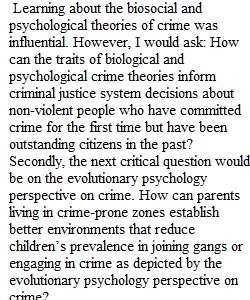


Q 1 Part 1 of M2 Reflection Journal is based on what you have learned in M2 Module Material: Psychopathy, mental illness, and brain-violence link. Formulate three critical questions about the things you have learned there: • Critical Question 1: • Critical Question 2: • Critical Question 3: Part 2 should be based on the following two articles (read the article and connect the themes and important questions raised in the articles with your No-prep Journal ideas, and write a couple of paragraphs reflecting on this): a) What You Don't Understand about Suicide Attacks https://www.scientificamerican.com/article/what-you-don-t-understand-about-suicide-attacks/ (Links to an external site.) b) Ten Politically Incorrect Truths About Human Nature https://www.psychologytoday.com/us/articles/200707/ten-politically-incorrect-truths-about-human-nature (Links to an external site.) You can write your essay in Microsoft Word and attach the file to this submission. Clearly indicate Part 1 and Part 2 of your answer. (Only you and the instructor/TA will be able to see journal entries. Reflection essays are graded based on how thoughtful they are and how well they incorporate and synthesize the module material.) Due on the last day of Module 2
View Related Questions